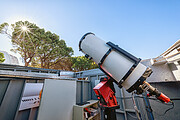Kitt Peak National Observatory to Offer New Experiences for Astrophotographers
New programs will provide astrophotographers with remote access to small telescopes and staff at a professional observatory
7 April 2022
Kitt Peak National Observatory (KPNO), a program of NSF NOIRLab, is offering, through the Kitt Peak Visitor Center, two new remote experiences for astrophotographers of all levels. Being able to observe remotely from an operating world-class professional observatory is a rare experience, and the opportunity for amateur astronomers to observe at night from such an observatory is unique to KPNO.
The first of these programs is called Remote Imaging with Kitt Peak SOLARIO Telescope, and it uses KPNO’s SOLARIO telescope, a 32-centimeter (12.5-inch) Ritchey-Chretien instrument meant for both scientific and public use. Astrophotographers can either operate the SOLARIO telescope themselves or have a trained expert guide them through it. The cost is $325 per night which covers an entire night of imaging from sunset to sunrise. Help from staff costs an additional $90. Multiple targets can be imaged in a single session if the user wishes. The raw data, including calibration frames, will be made available to the user within 24 hours. KPNO’s pristine dark skies, high altitude, and good atmospheric conditions provide an ideal location for remote imaging. Advance online registration is required through Eventbrite or VisitKittPeak.org.
KPNO is also pleased to offer a virtual PixInsight Workshop for Astrophotographers from 9 April 2022. This workshop is for anyone interested in learning to use PixInsight for processing astronomical images regardless of prior experience. Students will learn how to use custom process icons as a roadmap for processing most datasets, preprocess both one-shot color and monochrome data, and conduct linear image enhancements including deconvolution and linear noise reduction techniques. The workshop will also go over how to best stretch your data sets to achieve the best dynamic range of an image, and conduct nonlinear adjustments to improve sharpness, color, contrast, and noise reduction. In the evening, the class will use KPNO’s remote telescopes to acquire a new dataset (weather permitting) which will be available early the next morning. Advance online registration is required through Eventbrite or VisitKittPeak.org.The cost of the workshop is $249 for 1 day and will be instructed by Casey Good, an award-winning astrophotographer who has been teaching the Kitt Peak Visitor Center astrophotography classes since 2016.
Public on-site access to Kitt Peak National Observatory is still not permitted, but this is in the process of being re-evaluated as COVID-19 case numbers decline in Arizona. Please check NOIRLab's website for updates.
More information
NSF NOIRLab(National Optical-Infrared Astronomy Research Laboratory), the US center for ground-based optical-infrared astronomy, operates the International Gemini Observatory(a facility of NSF, NRC–Canada, ANID–Chile, MCTIC–Brazil, MINCyT–Argentina, and KASI–Republic of Korea), Kitt Peak National Observatory (KPNO), Cerro Tololo Inter-American Observatory (CTIO), the Community Science and Data Center (CSDC), and Vera C. Rubin Observatory(operated in cooperation with the Department of Energy’s SLACNational Accelerator Laboratory). It is managed by the Association of Universities for Research in Astronomy (AURA) under a cooperative agreement with NSF and is headquartered in Tucson, Arizona. The astronomical community is honored to have the opportunity to conduct astronomical research on Iolkam Du’ag (Kitt Peak) in Arizona, on Maunakea in Hawai‘i, and on Cerro Tololo and Cerro Pachón in Chile. We recognize and acknowledge the very significant cultural role and reverence that these sites have to the Tohono O'odham Nation, to the Native Hawaiian community, and to the local communities in Chile, respectively.
Links
Contacts
Amanda Kocz
NSF NOIRLab Communications
T: +1 520 318 8591
Email: amanda.kocz@noirlab.edu
Zane Landers
Communications Intern
T: +1 203 895 7426
Email: zane.landers@noirlab.edu






